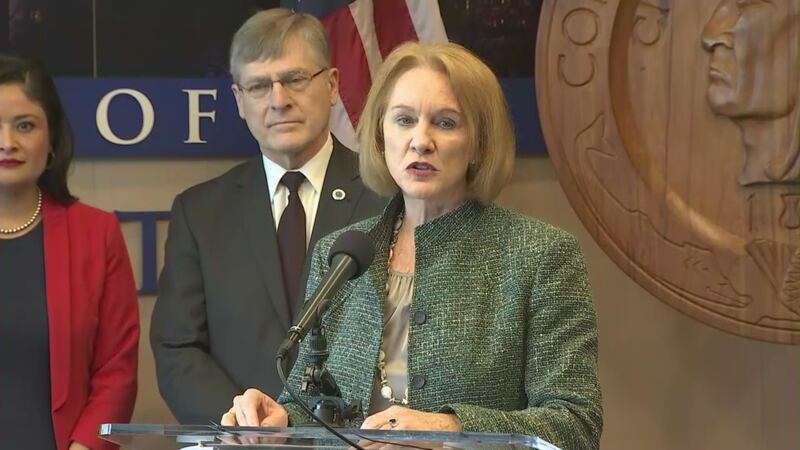SEATTLE — After nearly five years of legal marijuana in Washington the Trump administration took a step on Thursday that could threaten the current cannabis movement as we know it.
Attorney General Jeff Sessions, who has assailed marijuana as comparable to heroin and has blamed it for spikes in violence, revoked a policy that kept the Department of Justice from standing in the way of a state’s decision to legalize pot.
It could blow out part of the Washington state budget, where more than $700 million is expected in revenue from legal marijuana sales.
Quickly, here’s a breakdown of what’s happening:
- Sessions' new stance gives federal prosecutors the power to decide to aggressively enforce longstanding federal law prohibiting marijuana
- Sessions rescinded the "Cole memo" written by former U.S. Deputy Attorney General James M. Cole, who served during the Obama administration. That memo generally barred federal law enforcement officials from interfering with marijuana sales in states where the drug is legal. Read exactly what it outlined here.
- Session's anticipated move is adding to confusion about whether it's OK to grow, buy or use marijuana in states where the drug is legal.
- Washington state leaders – including Governor Jay Inslee, Attorney General Bob Ferguson, and former US Attorney and newly-elected Seattle mayor Jenny Durkan – are standing up for the voters' 2012 decision to have legal marijuana.
Gov. Inslee said it's too early to say whether Washington state will take legal action against the DOJ, but his administration is considering all options.
So what does this means for Washington state right now? Leaders say right now "we are going to continue operations.”
As 745 active licensed producers and 310 retailers continue with their businesses, Washington state has plans of its own when it comes down to anticipated pot revenue.
The Office of Financial Management’s current budget cycle – which covers fiscal years 2018 and 2019 – already shows that the state expects to generate nearly $741 million from taxes and licenses related to marijuana business and production.
That projected $741 million may only be a small slice of the nearly $44 billion budget, but it would fund a variety of health and social services programs. See a break down below.
Legal pot sales in Washington state exceeded $1.3 billion last year, with the state collecting more than $300 million in excise taxes. In 2016 and 2017, programs received funding like the projected totals for the current budget cycle.
As Democratic and Republican state leaders vow to protect pot sales – saying the state has come to rely on money from marijuana taxes – they have stopped short of promising protections for individuals who may be targeted. Leaders saying they still assessing uncertainties of the situation.
The Office of Financial Management tracks other aspects of how the cannabis industry has affected the state. It gives a look into who is using cannabis and how that is affecting enforcement. Here are some of their findings:
Among those surveyed, adults who use pot the most range in age from 18 to 24, with 21 percent using in 2015.
Among those surveyed, adults using pot the most range from ages 18 to 24, with 21 percent using in 2015.
For students who first used marijuana at age 13 or younger, no trends were seen, except among 10th graders, and that trend was downward, at 2.3 percent per year.
Among drivers involved in a traffic fatality who are tested for drugs or alcohol, there is no trend in the percentage of those testing positive for marijuana in combination with other drugs and/or alcohol. Similarly, no trend was identified for those who tested positive for marijuana only.
Drug-only DUI arrests moved from a high of 1,710 in 2011 to a low of 1,222 in 2015, for an overall decrease of 29 percent during those four years.
Marijuana incidents most commonly occur on highways and roads, and the number of incidents has decreased by 75 percent from 2012 to 2015.
- US Attorney General Jeff Sessions to end policy that let legal pot flourish
- Gov. Inslee: No change to state marijuana operations
- What is the Cole memo and what does it have to do with legal pot?
- Local leaders respond to decision to roll back federal pot policy
Incidents with police and citizens involving marijuana decreased by 63 percent between 2012 and 2015. Concurrently, incidents involving amphetamines increased by 72 percent and those involving heroin increased by 41 percent.
Among criminal activities involving marijuana, possession or consuming was<br/> the most common, decreasing by 65 percent from 2012 to 2015
U.S. Attorney for Western Washington Annette L. Hayes released a statement on Sessions’ move. While she did not give a concrete response about moving forward, she said her office would continue to "focus on those who pose the greatest safety risk to the people and communities we serve."
- US Attorney General Jeff Sessions to end policy that let legal pot flourish
- Gov. Inslee: No change to state marijuana operations
- What is the Cole memo and what does it have to do with legal pot?
- Local leaders respond to decision to roll back federal pot policy
Cox Media Group








